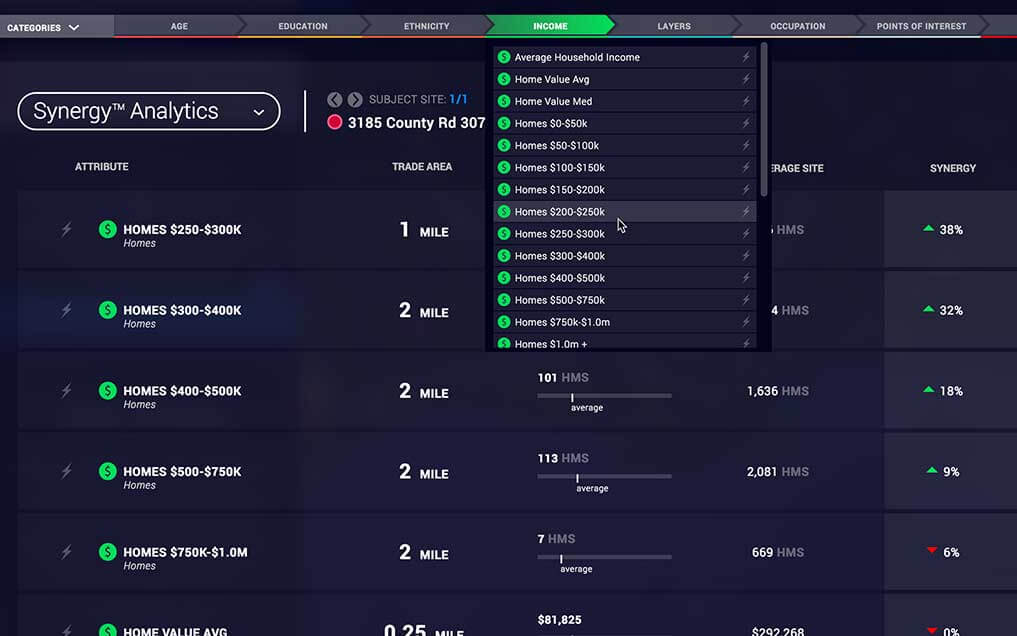What’s ahead for location intelligence tools in 2018?
Q&A with Keenan Baldwin, Co-Founder & Co-CEO, SiteZeus
Site selection technology is continuing to evolve rapidly and drive transformative change to “old school” site selection practices and methods. SiteZeus is on the cutting edge of that transformation with its location intelligence platform that is powered by the latest in AI and machine learning predictive analytics. Co-founder Keenan Baldwin recently shared his insights on what’s ahead for location intelligence.

-
How have site selection processes changed in the past year?
Keenan Baldwin: The introduction of machine learning and artificial intelligence is certainly becoming more prevalent. We see that occurring across a number of other industries, and segments, and even into our daily lives for that matter. Now we’re seeing that introduction becoming more of a topic within the real estate site selection marketplace, because it makes a lot of sense when you’re dealing with copious amounts of data.
Most management teams or individuals find it challenging or difficult to aggregate, process and digest that much information, whereas that’s exactly what these type of machines and algorithms and models have been built to do. They are adept at ingesting a plethora of data to ultimately determine through patterns and other recognition strategies what is driving performance. That can be done globally across the portfolio of stores, as well as on a more micro level by focusing on a certain region, city or individual site. So, it’s exciting to see what’s already happening and think about where we might be in three, four or five years.
-
Could you shed some more light on how the site selection process is changing from traditional, consultant-driven solutions to that of modern software-based technologies?
Historically, the marketplace has relied on solution providers who are very much taking a consultative or advisory role. There’s certainly value in that, but the more that this industry progresses, and machine learning gets introduced into the site selection process, the more that retailers are beginning to understand that the true value that consultants provide is somewhat fixed.
Consultants have typically looked at a model globally and analyzed different drivers by simple correlations, and they have not taken into account drivers unique to a particular geography or individual site. In addition, data is often not refreshed frequently, maybe once a year or even every three years. So, the ability of a consultant’s model to truly reflect reality can be a problem. Another big challenge that we hear from retailers is the lack of transparency in terms of how that solution provider came up with an answer or site solution.
We know that on an individual site level, each store is going to perform for a different number of reasons and those reasons may vary by site and by geography. Historically, we did not have the ability to actually see that level of change in the model. That is the difference that AI and machine-learning platforms provide, and it’s exciting to see the reaction of individuals and teams when they actually realize and see that this is something that does exist!
-
So, there are clearly disruptions ahead in the shift from traditional solutions to more data driven tools. How difficult is it for the traditional retailer to embrace that new technology?
The reaction will vary depending on the size of the organization, the individuals within that organization and receptiveness for those individuals to adapt to change. It doesn’t matter who you are, what organization you are, people resist change for the most part. However, we are living in somewhat of a unique time where tech-savvy Millennials have become a bigger part of the workforce. Certainly, there are organizations who are hiring Millennials for roles such as GIS manager, analytics director and chief data scientist that are more receptive and wide open to exploring new technology and data driven tools.
So, I think the implementation of moving from a historic solution, without a solution at all, to an AI driven solution can be relatively seamless and quick. We typically see that happen within a 30- or 60-day period. Some of the other benefits that are moving these data driven tools forward include the speed at which you can build and create location components and the level of transparency that you’re able to get out of these tools. That helps with the adoption of that level of change because you have a complete understanding right in front of you. You can see exactly what just happened with your data. Historically, retailers have had to ask a lot of questions, and they have had to wait for consultants to provide solutions. Consultant data may even be out of date by the time you first see it and needs to be refreshed.

Change is still difficult, but that trust and acceptance grows over time. For example, we no longer question why it is that a particular item pops up first in a Google search, because there’s a level of trust that there are powerful analytics working behind the scenes to do the job. So, it always goes back to trust, and over time I think the more prevalent that AI and machine-learning tools become within this segment, there’s going to be a greater level of trust and change will be received with less resistance.
-
What are the different ways that you think machine learning and AI will be able to solve for issues related to site selection in 2018?
You’re still solving the same core problems. So, whether that is market planning, feasibility study or individual application analysis or approval of a site, understanding your consumers and where they’re coming from, or what’s driving performance of each individual store, it’s the same questions that those management teams or individuals have always had. But, this is a better, more efficient, more predictable way to solve these problems, and that’s ultimately what it comes down to. If you’re asking a question and you’re expecting an answer, how confident are you in the answer that you’re getting back?
I think that AI and machine learning not only does that more efficiently, but it also does it more accurately for a number of reasons. Number one, you’re able to use an infinite number of variables. You’re not fixing the solution to five, 10 or 20 different data point. You can literally use hundreds if not thousands of data points on just one individual site, and you’re able to see exactly how or why I came up with that answer.
Even if you don’t agree with the answer as a human, at least you know why the machine came up with that solution. And it is knowing the why that helps to build trust. Just like people trust the Google search, the reason why they trust that is because they have built that trust over time. So, I think that the more prevalent AI and machine learning becomes in the industry, and the fact that these results are highly transparent, the trust will quickly mitigate any resistance that is left over.

-
Is site selection doomed to become obsolete, or can stores exist in the Amazon first world?
Oh, I think the question is a resounding yes! The fact that Amazon is building 300 brick-and-mortar locations should answer that question. There may be a misconception that retail is dying or retail is going away, but it’s just changing. Retail follows a cyclical pattern, and this is the next evolution, or revolution if you will. Change also is being fueled by our economy and our entire culture for that matter.
There’s no question that it will survive and thrive, but it will be in a different form. We are starting to see some preliminary results of that evolution. You may be looking at smaller footprints, smaller store prototypes and different prototypes where customers are coming in to touch and feel and try on a product and then it gets shipped to their home later that day or the next day. So, it becomes more of a showroom or a last mile delivery point.
That evolution is forcing retailers to think about their store and locations in a different way. They are asking themselves different questions, which is even more of a reason why they need to be making smarter choices and adopting these data driven tools.
Keenan Baldwin is a fifth-generation Tampa native. A graduate of The University of South Florida in 2010 where he earned his Bachelor’s degree in Psychology. Upon graduation, Keenan and his brother Hannibal, formed B3 Ventures (formerly Baldwin Beach Capital), which serves as a private equity & venture capital fund for the Baldwin Family Office.
The fund focuses on emerging restaurant & specialty retail opportunities mainly within the Southeast. During the last 36 months, B3 Ventures Fund has led investments totaling $9,600,000 into emerging entrepreneurial businesses. Recent transactions include Yogurtology, Fitlife Foods & SiteZeus.
Did you enjoy this post?
Give it a star rating to help us bring you great content!
Recommended Posts


